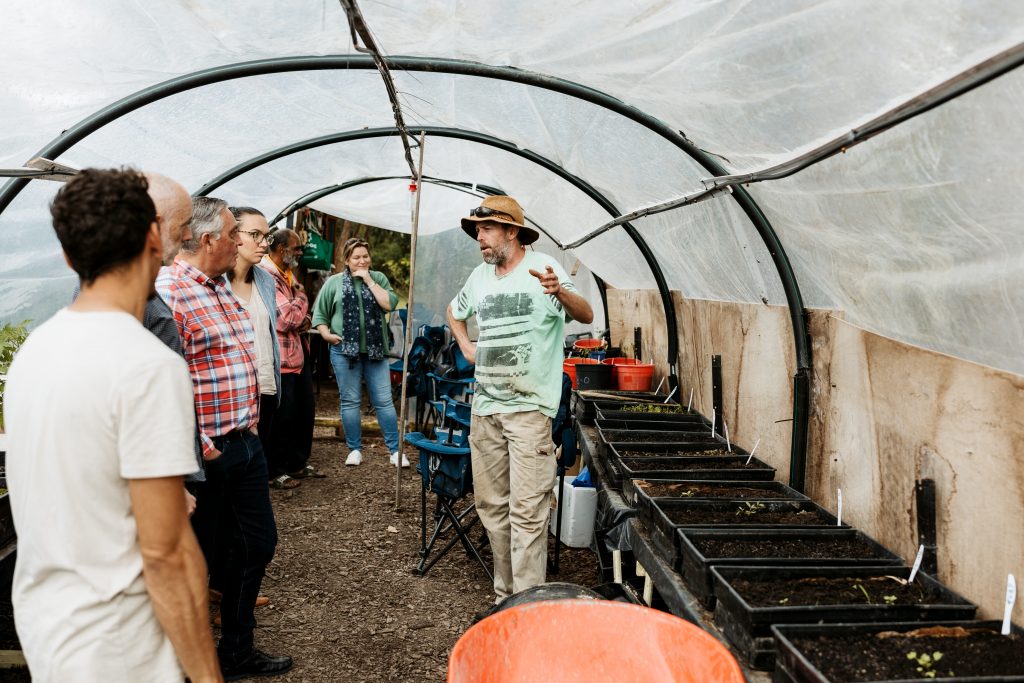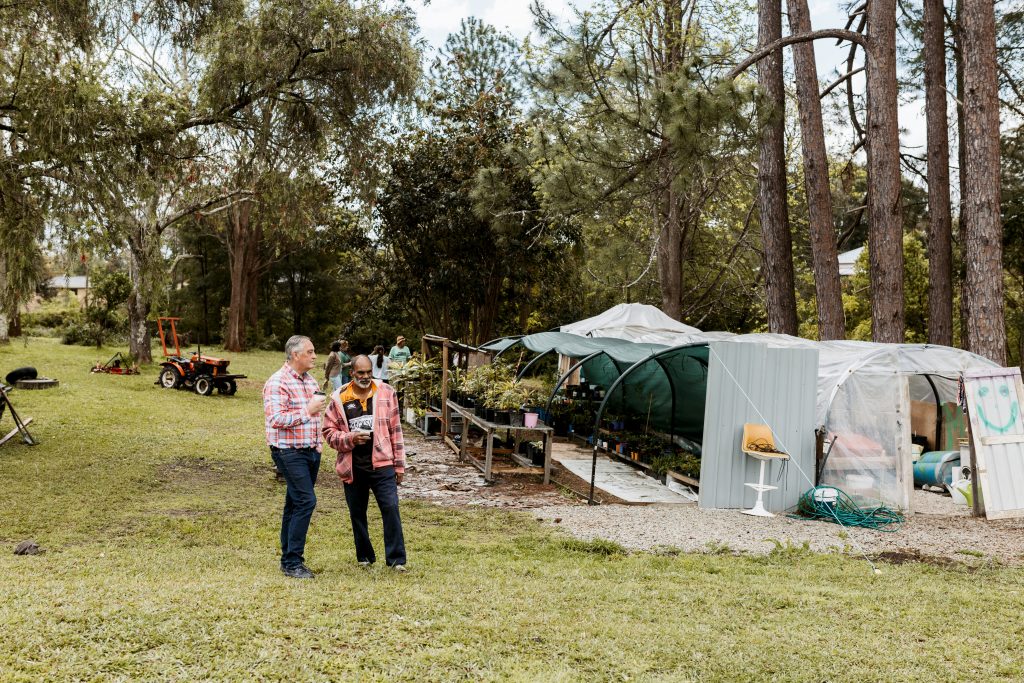Foundation for Rural & Regional Renewal (FRRR)
Four Victorian philanthropic organisations have joined forces in an exciting $5 million partnership with the Foundation for Rural & Regional Renewal (FRRR) that will strengthen the capacity and resilience of communities over the next five years.
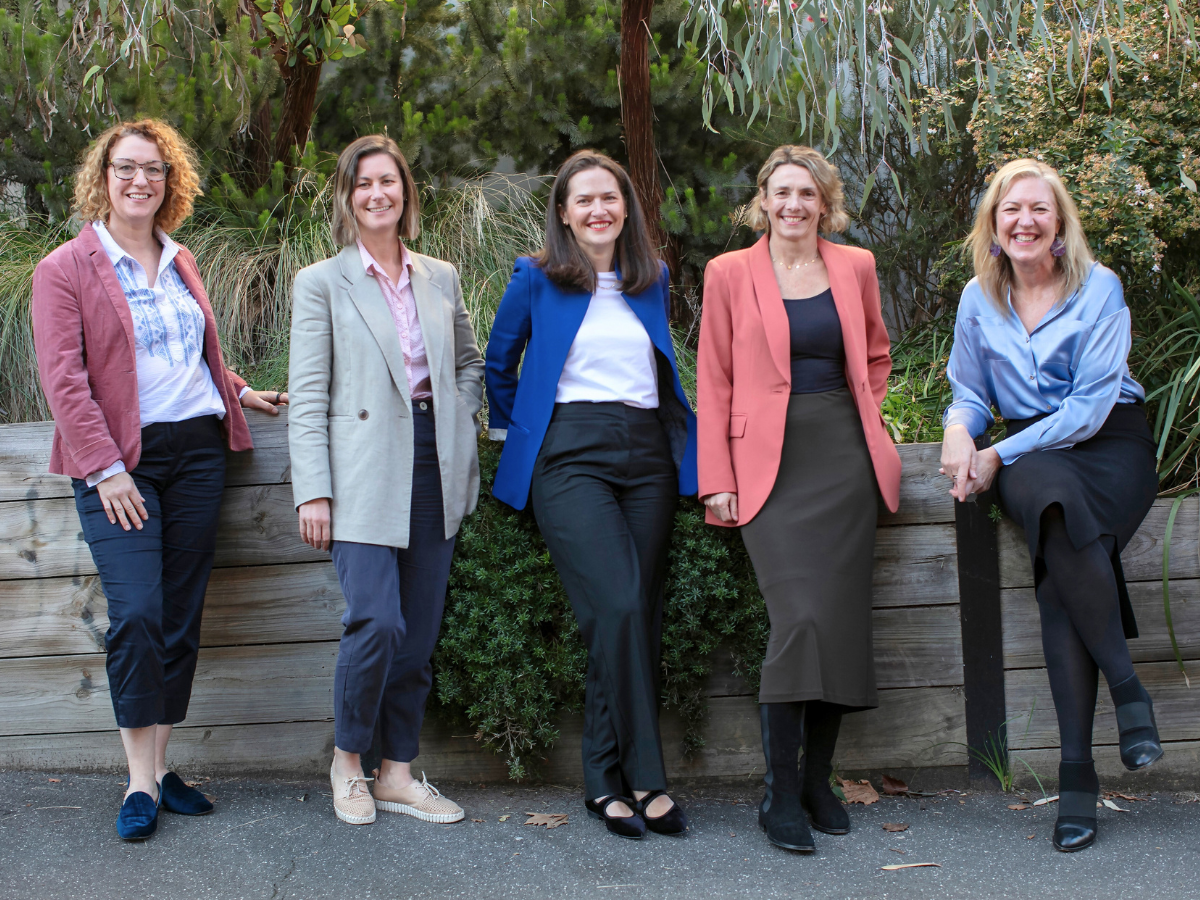
Three Victorian communities will be named later this year, following a detailed process involving needs analysis, mapping key issues, causes of disruption and the funding landscape, and an exploration of community readiness for the investment.
The partnership comprises the Helen Macpherson Smith Trust, the Jack Brockhoff Foundation, The Ross Trust, and William Buckland Foundation. FRRR will deliver the program, following the success of its similar Investing in Rural Communities Futures program (IRCF) in NSW over the past five years.
The funding will enable local not-for-profits (NFPs) to become more confident and collaborative in their approach to improving and sustaining the vibrancy, resilience, and liveability of their communities, ultimately enabling them to thrive, not just survive, especially during times of natural disasters.
“Investing in and strengthening the social and economic fabric of Victorian rural communities fosters long-term resilience,” says the CEO of FRRR, Natalie Egleton. “We know that our model can deliver these outcomes, and the multi-year model builds a whole-of-community approach.”
The $5 million funding will be used to employ local facilitators, deliver capacity building activities for the local NFPs such as governance training, volunteer development, marketing and fundraising support, and events. Funds will also be allocated to the three communities via grants for priorities and for organisational capacity building. Evaluation is central to the program.
The NSW program
The NSW program started in 2018 after FRRR recognised that many grassroots organisations were ‘locked out’ of philanthropy and often unable to access opportunities to invest in their own organisational capacity due to their size, distance, financial capacity, and lack of staffing.
“Most of the NFP work that happens in small towns is volunteer run and there just isn’t any money or resources to help them be sustainable,” Natalie said. “Local leaders know what is going to make the biggest difference in their community and we knew that supporting local solutions would be key.”
The program commenced in Junee, Leeton, and Nambucca Valley with the support of Vincent Fairfax Family Foundation. The Snow Foundation and Bendigo Bank then joined to enable FRRR to take the program to Ulladulla, Batemans Bay, Nowra, and Bay & Basin. The Australian Government provided additional funding to expand the program in the Shoalhaven region and launch the program in Bega through their Black Summer Bushfire Recovery Program.
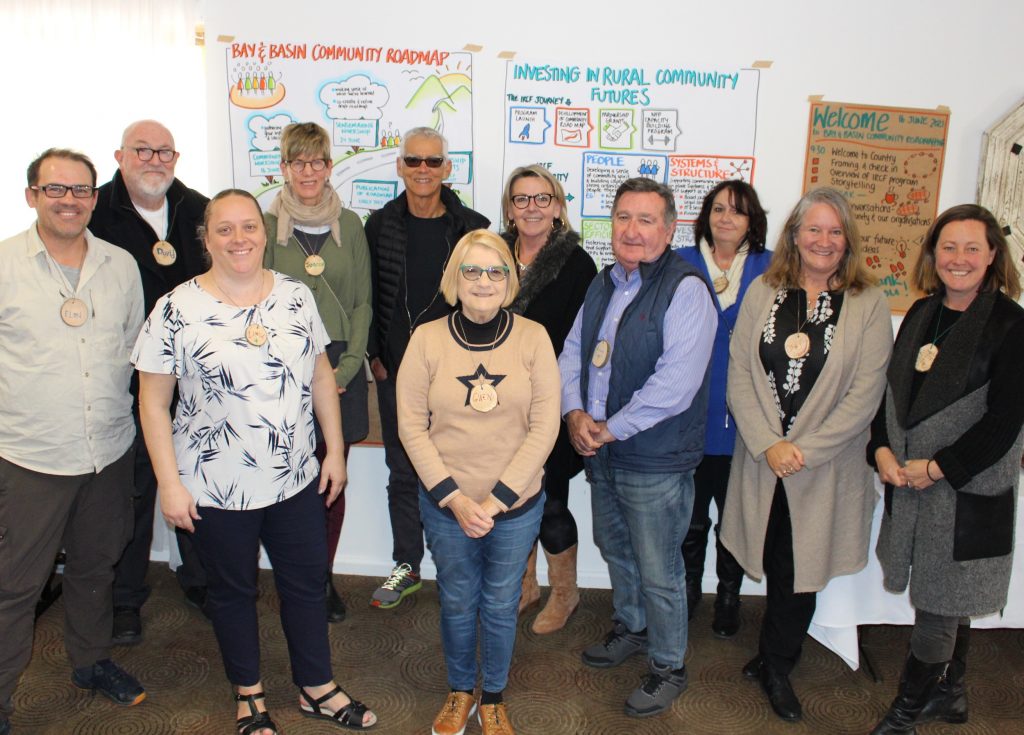
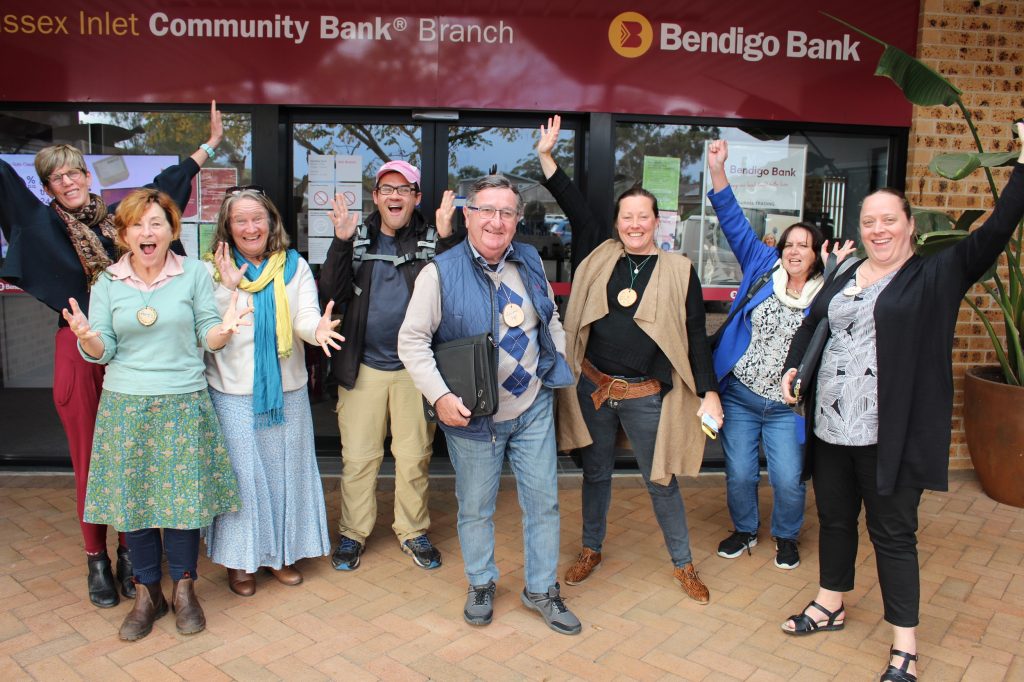
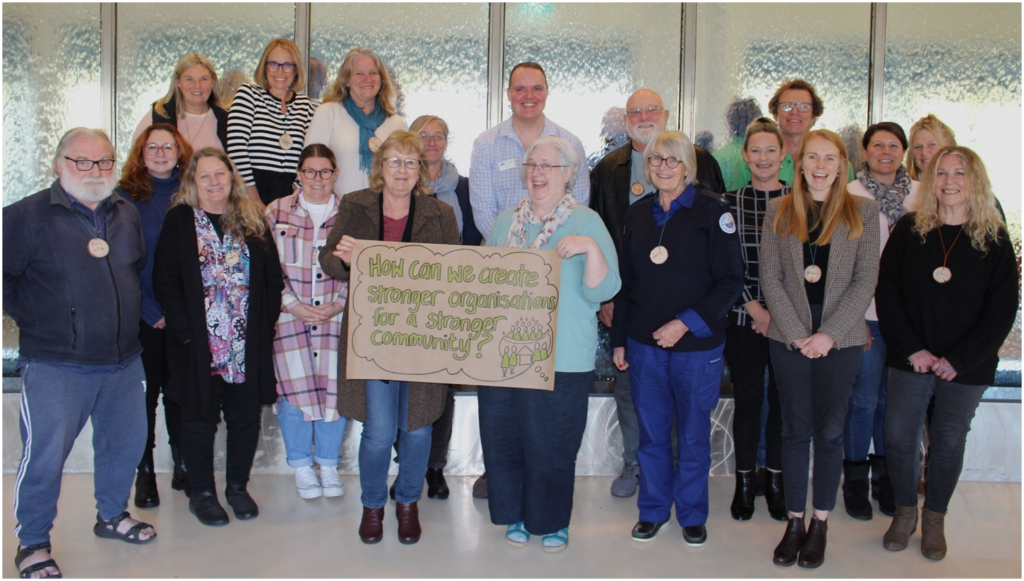
Evolution of the Victorian partnership
The plan to bring a similar program to Victoria began in late 2022 after The Ross Trust began discussions with FRRR and the Helen Macpherson Smith Trust. Conversations then began with the Jack Brockhoff Foundation and William Buckland Foundation. Importantly, the leaders in all these organisations had strong existing relationships and numerous granting collaborations with each other, as well as with FRRR.
“I could see that this program was about building the skills, resources and capacity of local not-for-profits – and that it was working,” said Sarah Hardy, the CEO of The Ross Trust. “It was also clear that any Victorian partnership would need a commitment of $5 million to get off the ground. That is a lot of money for any one mid-sized philanthropic, when we all have ongoing projects.”
Sarah said the positive and trusting relationships between the five organisations meant they were able to openly discuss whether it was a project that their trustees and directors would support.
The CEO at the Helen Macpherson Smith Trust, Debra Morgan, said the early conversations and resulting partnership benefited from like-minded organisations working together.
“We realised early that we couldn’t do anything this significant alone, and that working together would help us to affect better and longer-term change,” Debra said. “This collaboration sets a new bar in how we work together, and it’s certainly the longest-term project we have funded under our new strategy.”
Louise Kuramoto, the CEO of the Jack Brockhoff Foundation, said that it was the first time, other than a commemorative grant, the foundation had made a five-year commitment to a project.
“The philosophy behind this program is not unusual, but the amount and duration are,” Louise said. “The solid track record of FRRR gave all four funders the confidence to invest at such a scale. It’s wonderful that we can come together to support communities and the people in them.”
For the Grants Lead of William Buckland Foundation, Ferdi Hepworth, the program perfectly aligns with her organisation’s long commitment to country Victorians.
“We have had a long partnership with FRRR and more recently we’ve been funding a program where FRRR distributes small grants to communities, and we had already been talking about how we could better support them,” Ferdi said. “It was very easy to say yes to being part of this partnership.
“We often see governments and big business leading change, but it’s the people in the community who best know the ingredients required to help that community thrive. This project supports those people with the skills, knowledge, and confidence to work together to achieve change.”
After many emails, online and in-person meetings, visits to NSW communities, and discussions with their trustees and directors, the four funders set themselves a deadline of June this year to see if they could raise the $5 million to commence the program in July 2025. By April, they had done it.
“For four mid-sized philanthropic organisations to raise $5 million when we already have current commitments shocked us all, but in a good way,” Sarah said.
How the program will work in Victoria
FRRR will study past granting trends and community profiles and will map issues and disruptions occurring or on the horizon, as well as the funding landscape, to select the three communities. The process will also include community consultation, with a shortlisting process that will invite expressions of interest. Given the program is grounded in deep collaboration and co-design with each community, it is vital that there is a sense of readiness to embark on the five-year partnership.
Once communities are selected, a locally based community facilitator will work with the local NFP sector to scope priorities, gaps and opportunities that will be collated into a sector roadmap. The roadmap, which will be refreshed annually, will be the framework for activating capacity building activities and funding, and for monitoring progress, celebrating change, and adjusting priorities as needed.
Natalie from FRRR said she was confident many Victorian communities would be enthusiastic about the opportunity, adding that, like in NSW, it was likely the communities would be at very different starting points.
“Success is turning out to be different in each community, which is fine because the indicators we are interested in all focus on changes in mindset and sector collaboration to drive new and better opportunities for their communities – and that has been a major success,” Natalie said.
FRRR will employ a program manager who lives in Victoria and is familiar with key concerns and issues in the state. Local facilitators will also be employed in each community. Over time, it is expected that more than 20 people will be employed in the program. Staff and volunteers will benefit from training and professional development and possibly partnerships with councils, TAFEs and universities.
Deb Samuels is the People Portfolio Lead at FRRR and will oversee the Victorian project.
“We now have five years of NSW evaluation data and interviews and the recurring theme is that people in the communities feel much more empowered to make decisions and collaborate,” Deb said. “If they know a large grant opportunity is coming up, they know who to call to say, ‘let’s pool our efforts to apply’.”
Deb cited examples of success that could be replicated in Victoria, such as one NFP leader rallying to halt the closure of a local bank branch that was relied upon by vulnerable residents, and another leader now running for mayor.
“Local leaders involved in the IRCF program have shared they would not have had the confidence to do things like that in the past,” Deb said. Young people can also engage with the program and see themselves as an important part of the NFP sector.
“One of the best things somebody said to me is that ‘the funders believed in us and invested in us, and now we believe in ourselves and what we can do’.”
Not-for-profit organisations (NFPs) across the South Coast are sharing more than $360,000 across 27 projects that will strengthen their capacity to support their local communities.
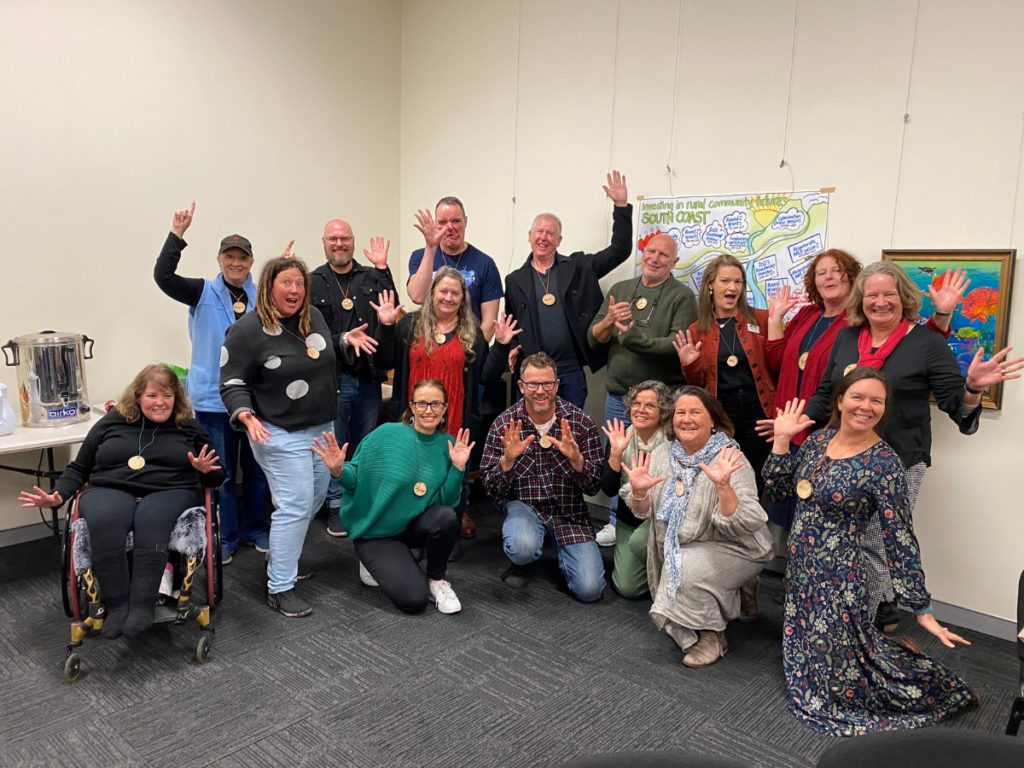
The funding comes through FRRR’s Investing in Rural Community Futures (IRCF) program, in partnership with The Snow Foundation and Community Enterprise Foundation, which has been operating across the South Coast since 2020.
Carolyn Ardler, FRRR’s Program Manager for the IRCF South Coast program, said that the premise of the IRCF program is to encourage local groups to engage in greater collaboration, skill-building and, where possible, share resources and learnings for the benefit of the whole community.
“The IRCF program is all about helping local groups to be better able to support the communities and causes they were set up to assist. It involves a mix of grants directly to individual NFPs and workshops and training (usually led by a local group on behalf of other NFPs), all supported by a facilitator in each community who works alongside the groups. The program is entirely community driven, starting with a co-designed community roadmap that’s updated regularly, which helps FRRR and our partners prioritise where to direct investment in each community.
“Over the last three years, there’s been significant investment in strategy and planning, and now we’re seeing more projects around efficiencies, systems and processes, alongside continued investment in people and their capacity. As we head toward the culmination phase of the program, we’re also seeing communities establishing the systems and processes to sustain the networks, connections and collaborative ways of working they’ve established in recent years, so that’s exciting,” Ms Ardler said.
The Snow Foundation was the first donor partner to support the program on the South Coast and local resident and Chairman of the Foundation, Terry Snow, said that it’s so rewarding to see the long-term changes that have come about.
“While there’s still a few months until the program formally concludes, it’s been wonderful to see how well the local not-for-profit and community groups have embraced the chance to come together, agree where they could all benefit from upskilling and sharing their experiences, and to then put it into action. There are several organisations that are now much stronger and they are better able to support not only their chosen beneficiaries, but also other not-for-profit organisations. We’re delighted to have been part of this and look forward to seeing these projects that are being announced today also make an impact,” Mr Snow said.
Bay & Basin projects
In the Bay & Basin area, seven projects are sharing $76,749, thanks to the support of Bendigo Bank’s Community Enterprise Foundation. The focus in this round of funding was strongly on youth-aligned organisations and projects. This part of the South Coast is one of the more recent areas to come on board the IRCF journey, so the groups are still building connections and working closely with the local IRCF facilitator.
David Impey, CEO of the Community Enterprise Foundation, said it’s really pleasing to be able to support more projects that will strengthen the future of these local organisations and the region.
“It’s exciting to see a diverse range of projects continuing to come forward from local NFPs. This round, we are pleased to see several that focus on engaging young people, which is great to see as they are critical to ensuring a strong future in these regions. But there are also a number of projects that will enhance the capacity of these organisations, such as better systems and processes, upskilling staff or volunteers and creating assets and resources that can be shared across NFPs. This goes right to the heart of ensuring strong communities and we are delighted to be part of it.”
Nowra projects
Ten projects in and around Nowra are sharing $114,911, thanks to support from The Snow Foundation. This is the final round of grants for Nowra and we’ve seen increased networking activities and discussions about how to collaborate on projects. This tranche of projects has a strong focus on supporting people and developing systems.
Batemans Bay projects
This is also the final round of funding for Batemans Bay and five projects will share $94,946, with support from The Snow Foundation. With these grants there is a focus on creating efficiencies and most projects are collaborative, with more than one organisation benefitting.
Ulladulla projects
Thanks again to The Snow Foundation, five projects are sharing $76,125, most of which focus on enhancing administration systems and procedures to improve capacity and better support the community.
The full list of grant recipients and their projects are below.
| Organisation | Project | Location | Grant | |||
|---|---|---|---|---|---|---|
| BATEMANS BAY | ||||||
| Anglican Diocese of Canberra and Goulburn Parish of Moruya | Moruya Commons Community Hub - Fostering Participatory Culture Foster collaboration, reducing duplication and strengthening networks across the not-for-profit sector by providing IT equipment and governance for a shared office space. | Moruya | $20,546 | |||
| Arts Council of Eurobodalla Inc | SASI - Shared Administrative Systems Implementation Ease volunteer working conditions through employing a co-ordinator to develop procedures and policy manuals for three organisations - Arts Council, River of Art Festival and Sustainable Agriculture Eurobodalla (SAGE). | Moruya | $30,000 | |||
| Southcoast Health and Sustainability Alliance | Governance In Action - Enhancing Sustainability and Collaboration for NFPs Support organisation to proactively tackle climate change, with training for volunteer committee in financial management, governance and administrative systems. | Batemans Bay | $14,400 | |||
| Sustainable Agriculture and Gardening Eurobodalla | Policies, Procedures and Capacity Building for SAGE Volunteers Support development of strong local food systems, offering events and training opportunities for community, by establishing an event management / coordinator position. | Moruya | $10,000 | |||
| The Family Place Inc | Building a Resilient Future: Advancing Sustainable Growth through Fee for Service Expansion Expand access to support services by growing organisation's capabilities, through increased staffing resource to enable CEO to focus on building sustainable OOHC model. | Moruya | $20,000 | |||
| BAY & BASIN | ||||||
| Bay & Basin Community Resources Limited | Work Re-Design to Thrive and Grow Upskilling staff to re-design workflows and tasks to increase the efficiency of a community organisation. | Bay & Basin region | $29,734 | |||
| Changing Tide Wellness Ltd | Community Connect: Empowering Wellness Creating an accessible, inclusive website, so those with disabilities can more easily access information about appropriate services. | Bay & Basin | $5,426 | |||
| Community Champions - SP&SGB Inc | Community Champions - Bay & Basin Community Growth and Empowerment Workshops 2023/24 Encourage collaborative community conversations to explore ways to better support the community across the not-for-profit sector. | St Georges Basin / Sanctuary Point | $4,000 | |||
| Noah's Ark Centre of Shoalhaven Inc | Building Bay & Basin Administration support for a service provider that is focused on children with disabilities and special needs, so they can expand and embed their services. | Sanctuary Point | $7,488 | |||
| Sanctuary Point Community Pride Incorporated | Sanctuary Point Nexus: Fostering Pride and Unity Bolster community engagement and pride in Sanctuary Point by creating a comprehensive visual of community assets. | Sanctuary Point | $5,650 | |||
| Sussex Inlet Foundation for Community Development | Building Youth-focused Services for Sussex Inlet Encourage youth engagement and involvement in the community through the development of a Youth Advisory Group. | Sussex Inlet | $9,500 | |||
| yiliga-miraral Wellbeing Team Vincentia High School P&C Association | walawaani-ngarn Into The Future Measuring the impact of a program that provides wellbeing support to students and families to help attract additional funding, so it can continue. | Vincentia | $14,951 | |||
| NOWRA | ||||||
| Beyond Empathy Limited | BE Studios Capacity Building Project Strengthen organisational capacity in Nowra and the Shoalhaven region by engaging someone to develop a business plan, marketing strategy and promotional materials to support employment pathways for young artists. | Nowra | $14,144 | |||
| Kangaroo Valley Voice Incorporated | Kangaroo Valley Voice Capacity Building and Longevity Project Enhance organisational capacity and sustainability by employing part-time staff and developing a website for The Kangaroo Valley Voice newspaper to better connect the community. | Kangaroo Valley | $20,000 | |||
| Noah's Ark Centre of Shoalhaven Inc | Our Workforce - A New Way Boost organisational capacity by creating a tool to help a children and family service provider transition to flexible working. | Nowra | $9,400 | |||
| Nowra Community Food Store Incorporated | HR Plan Implementation Strengthening operations by providing training and capacity building for staff and volunteers at a low-cost grocery store, which is run as a social enterprise. | South Nowra | $7,377 | |||
| Nowra Local Aboriginal Land Council | Strong Board Foundations Strengthening operations through training in IT, cyber-security and financial record keeping for staff and Board members to support their transition to digital record-keeping. | Bomaderry | $9,500 | |||
| Shoalhaven Business Chamber Incorporated | Resource Hub Shoalhaven Upgrading a website to create a central hub for policies, procedures and tools for members. | Nowra, North Nowra, Bomaderry, West Nowra | $11,490 | |||
| Shoalhaven Neighbourhood Services Inc | Creating Efficiencies: Streamlining Policies and Procedures Creating efficiencies by streamlining processes, policies and practices to comply with current regulations. | Nowra | $10,000 | |||
| Shoalhaven Womens Resource Group Ltd | Strategic Aim 2 - Successful and Sustainable Operation of ROCC Build organisational stability by engaging a HR consultant to review HR and WHS policies, as well as conduct team building and wellbeing activities to strengthen an organisation’s culture. | Nowra | $15,000 | |||
| South Coast Beef Producers Association Incorporated | Upgrading the South Coast Beef Website Upgrading a website to handle financial transactions such as invoices and taking payments, thereby streamlining processes and freeing up staff. | Nowra | $3,000 | |||
| Waminda South Coast Women's Health and Wellbeing Aboriginal Corporation | Blak Cede Social Enterprises - Pathways to Cultural Employment | Terara | $15,000 | |||
| ULLADULLA | ||||||
| Growing Together South Coast Incorporated | Growing Stronger Together Support skills development with training in market gardening and first aid, developing an e-commerce platform and sourcing funding streams for new NFP growth. | Milton | $14,900 | |||
| Safe Waters Community Care Inc | ASES Accreditation for Financially Sustainable Homeless Services in Ulladulla Build expansion of homelessness service, allowing access to longer term government funding with formal Australian Service Excellence Standards (ASES) accreditation and policies and procedures update. | Ulladulla | $16,565 | |||
| South Coast Bookclubs Incorporated | Growth of Services Foster literacy, social connections and engagement by collaborating with three organisations, pooling resources, and providing local book access. | Ulladulla | $7,200 | |||
| StoryFest Incorporated | StoryFest Sustainable Schools Program Encourage youth to develop a love of reading and writing, by building an ongoing sustainable financial model to host the Annual Literacy Festival for school students. | Milton | $15,000 | |||
| The Dunn & Lewis Youth Development Foundation Limited | Connected Space Develop youth employability / life skills via inspiring stories / achievements, through creating a communication strategy and building a website. | Ulladulla | $22,460 | |||
Regenerate Bega Valley and Regenerate Shoalhaven – two leadership development programs designed in response to the 2019-20 bushfires – are currently open for applications.
Leaders of local not-for-profit organisations in the Bega Valley and Shoalhaven region are invited to apply for locally-delivered leadership development programs, designed to build their capacity to help with ongoing bushfire recovery and response.
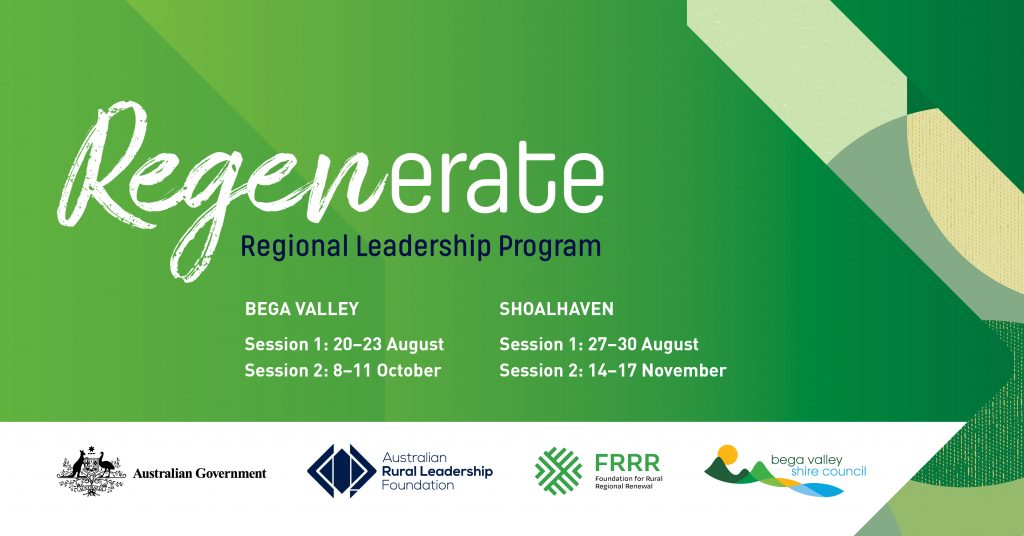
There are 24 scholarships offered in each location for local leaders who’ll get access to some of the best leadership thinking and practice available, plus practical tools and skills via experiential learning.
The Australian Government’s Black Summer Bushfire Recovery grants program is funding the programs, to be delivered by the Australian Rural Leadership Foundation (ARLF) in partnership with the Foundation for Rural & Regional Renewal (FRRR).
FRRR’s Acting CEO Sarah Matthee explains they’re part of FRRR’s Investing in Rural Community Futures program which aims to build confidence, ability, skills and longer-term sustainability of the region’s NFPs.
“We know local not-for-profits are often leaned on significantly, especially in the event of a natural disaster as was the case with the Black Summer bushfires,” she says.
“Pressure on programs, services and volunteers is leading to fatigue and a depletion of local resources. From our work over the last few years in both these communities, we’ve seen an overwhelming appetite for cross sector collaboration and planning within the community. The ARLF leadership programs will help boost their capacity and impact.”
ARLF Chief Executive Matt Linnegar says the Regenerate Shoalhaven and Bega Valley programs will help local leaders to collaborate, build networks and lead community initiatives.
“When future emergencies, or opportunities occur, this network will be invaluable. They won’t be just names and positions; they’ll know and trust each other and be able to work through the challenges in front of them, to build resilience.
“This leadership network will guide and empower communities to address bushfire recovery priorities aimed at rebuilding and growing their local economy.”
For Carina Severs, manager at Eden Community Access Centre and chair of the Eden Recovery and Resilience Alliance, resilience is about knowledge.
“I’d like people to know what’s available, to know the ‘capability and capacity’ of frontline emergency services, as well as the support services such as Red Cross, CWA have. Resilience is about learning skills and being able to look after yourself as best you can, but it is also about showing care for those around you – your neighbours, friends and others.”
Also welcoming the Regenerate programs, Kangaroo Valley community champion Nat Harker reflects: “No lives were lost, but our community has changed. Some people have since left, most are still carrying trauma but we are working closely together to build resilience for the future – to strive, survive and then thrive.”
Applications for the Regenerate Bega Valley and Regenerate Shoalhaven leadership programs are now open. Each program is open to volunteers or employees in the not-for-profit sector. There will be two four-day residential sessions starting in August. For more details and to apply, visit rural-leaders.org.au (regional programs). Applications close on 18 June.
Local NFP leaders invited to join a roadmapping workshop
The Foundation for Rural & Regional Renewal (FRRR) and Bega Valley Shire Council are pleased to announce the start of a new initiative under the $1.3 million Australian Government Black Summer Bushfire Recovery Grants Program.
Investing in Rural Community Futures (IRCF) Bega Valley – Resilience Connection and Place Project builds on the work done over the last year through FRRR’s Investing in Not-for-Profit Capacity in Regional NSW (INFPC) program.
IRCF Bega Valley will support not-for-profits (NFPs) by strengthening their capacity to service local communities through a mix of on-the-ground support, using local facilitators and access to workshops and training.
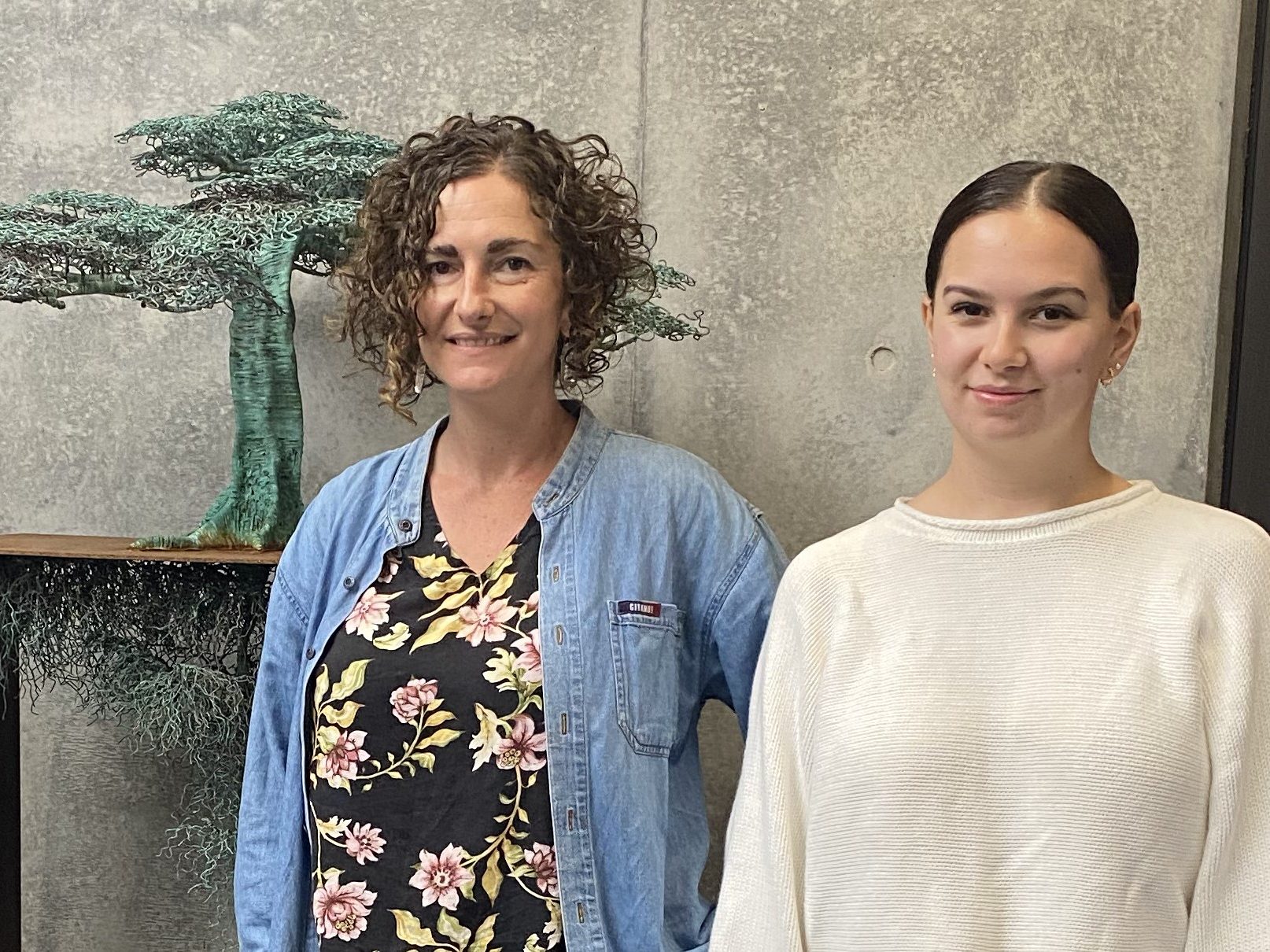
Bega Valley Shire Council is hosting two part-time facilitators, Leah Szanto and Bree Morgan. The facilitators will be connecting with groups across the shire to identify ways in which the local NFP sector can strengthen and adapt to changing community needs in order to thrive. NFPs will be invited to participate in a collaborative planning process aimed at building their capacity and ensuring the sustainability of individual organisations and projects through networking, skill development and community-led initiatives.
The IRCF model is currently being implemented in seven other communities across NSW. A key element is a road mapping process where goals and priorities are decided by the community, for the community. Work has already been done on this through the INFPC program over the last 12 months and now a roadmap will be designed at a workshop in Bega on Tuesday 14 March at 9:00 am. All local NFP leaders are invited to attend and registration is essential via https://frrr-bvsc-workshop.paperform.co/.
FRRR’s IRCF Program Coordinator, Carolyn Ardler, said this locally co-designed program will help the Bega Valley become even stronger than it was before the bushfires.
“It’s been great to see support being channelled into Bega Valley communities following the Black Summer bushfires, but we have also heard that it’s been overwhelming in many respects,” Ms Ardler said. “This new program will allow NFP community organisations and local leaders to work together to identify gaps in their capacity that may be hampering their ability to make the most of the funding and support that they have access to.
“It will also strengthen connections between NFP organisations and other communities where it operates. We’ve seen groups collaborate on projects that are truly transformational for their community, so it’s exciting to see the program kicking into gear.”
Council’s Community Development Coordinator, Chani Keefer, said it was great to be partnering with FRRR on this program.
“The goal of IRCF Bega Valley isn’t just to recover from the bushfires, but also to make our community stronger for the future,” Ms Keefer said. “This model will allow local community leaders to prioritise where they need to build their skills and capacity so they can work collectively towards a socially, economically and environmentally stronger Bega Valley.
“Having local facilitators on-the-ground has proven to be critical in other communities where this model has been implemented.”
To find out more about the IRCF program or to get involved, visit ircf.frrr.org.au/Bega or contact FRRR Carolyn Ardler, IRCF Program Coordinator – South Coast on 1800 170 020.
FRRR announced today that they have appointed two facilitators in the Shoalhaven region to support the ongoing delivery of their Investing in Rural Communities Futures program.
These positions are being funded using part of the $1.3 million investment made by the Australian Government, through the Black Summer Bushfire Recovery Program, which FRRR announced in November 2022.
The Investing in Rural Community Futures (IRCF) program has operated in the Shoalhaven and South Coast area since 2020, thanks to support from The Snow Foundation and Bendigo Bank, through their Community Enterprise Foundation. It is designed to help increase the capacity of the myriad of not-for-profit organisations who are so critical to the sustainability and vibrancy of the area.
Over the last three years, not-for-profits in Nowra, Ulladulla, Bateman’s Bay and more recently the Bay and Basin communities have come together to develop a roadmap of the assistance and skill-building that will help local NFPs to prepare for, respond to and recover from natural disasters, as well as the opportunities in the community. The most recently Federal Government funding means that support can now extend to Lake Conjola and Kangaroo Valley, areas that were severely affected by the Black Summer Bushfires.
The appointment of the two facilitators is the latest stage in the roll out of the funding from the Australian Government. That funding is also being used to support leadership and skill development, such as participation at the Art of Hosting workshop which is underway at Willinga Park in Bawley Point this week.
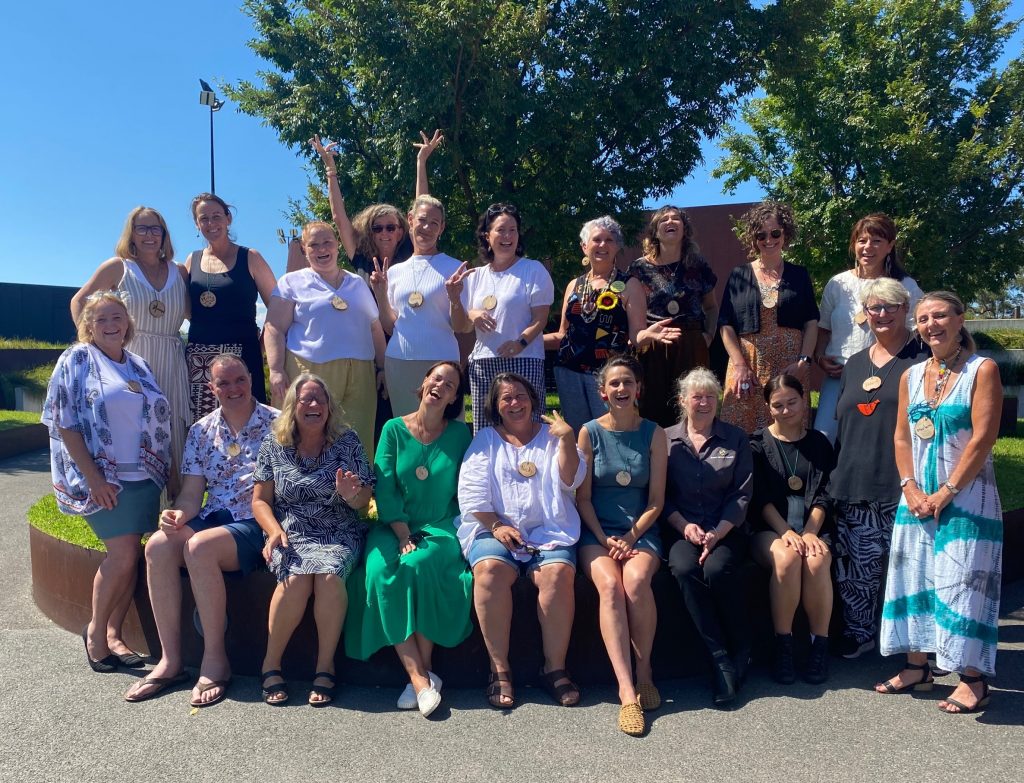
Attendees at Art of Hosting workshop 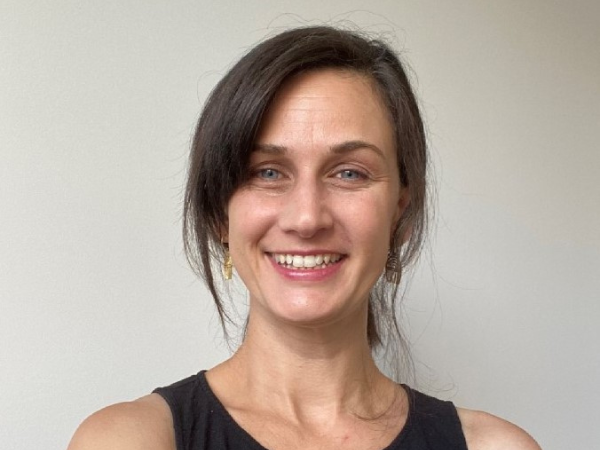
Kate McBride, Bay and Basin Facilitator 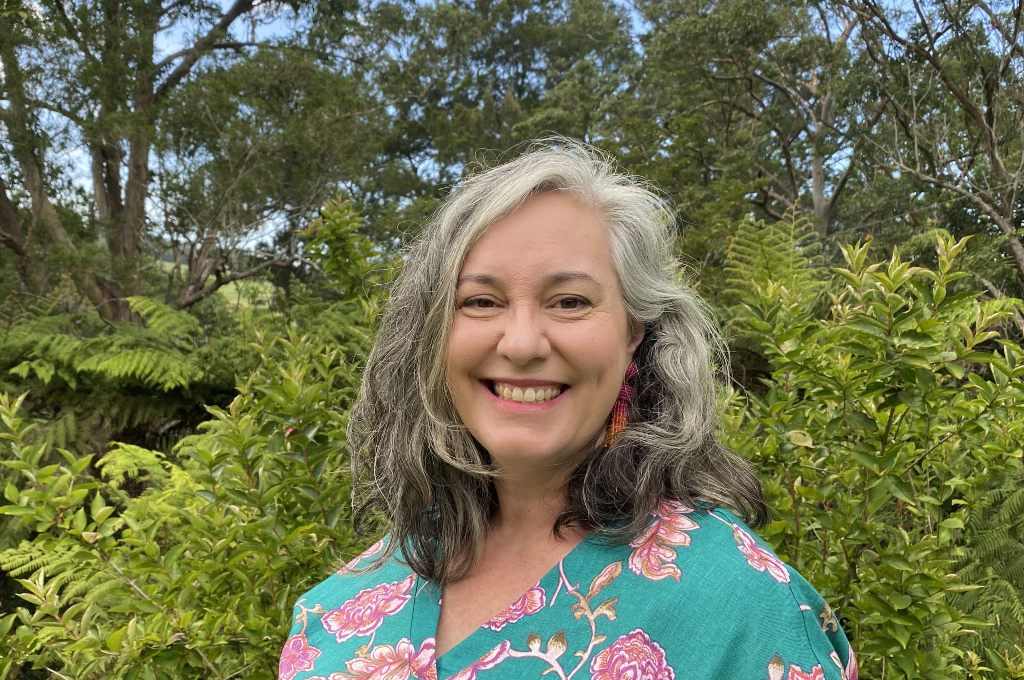
Meg Stratti, Nowra and Kangaroo Valley Facilitator
Meg Stratti will be working with communities in Nowra and Kangaroo Valley. She has lived in the Shoalhaven for the last 10 years, working to support local communities primarily through roles in adult education.
Kate McBride, who will work with Bay & Basin communities has lived on Yuin Country for around 20 years, and brings more than 15 years’ experience in capacity building and community engagement within not-for-profits (NFPs), grassroots community organisations and local government sectors.
Meg and Kate join Monique Carson (looking after Ulladulla and surrounds) and Jules Klugman (Batemans Bay) in working with community groups across the South Coast.
FRRR’s IRCF Program Coordinator for the South Coast, Carolyn Ardler, says that the additional Government support is a great opportunity to build upon the work they have been doing in the local communities with the support of philanthropic partners through the IRCF program.
“This workshop is the first chance that we’ve had to bring the facilitators together with local community leaders. All of them are attending the Art of Hosting workshop, which will enhance everyone’s ability to engage in conversations about the issues that matter. Together with the roadmap, this will ensure we’re all on the same page and can continue to work together to ensure local leaders have the tools they need to work towards their goals and priorities.
“This session is just one example of how we will continue to use this program to make sure the communities themselves are leading the conversation when it comes to their recovery,” Ms Samuels explained.
Matt Dell, President of Business Milton Ulladulla and Community Connect Southern Shoalhaven, says it’s rewarding to see the funding having such a direct benefit on the Shoalhaven communities.
“Enormous progress has been made in our local areas to recover after the devastating Black Summer fires. The IRCF program has been vital in supporting the community to rebuild and reconnect. It is absolutely essential the ICRF program continues with additional resources to empower our recovery and future resilience.”
Other upcoming initiatives include a leadership training program, which is being led by the Australian Rural Leadership Foundation, plus other sessions prioritised by the local community.
To find out more about the IRCF program in your community or to get involved, visit ircf.frrr.org.au or contact FRRR on 1800 170 020.
The Foundation for Rural & Regional Renewal today welcomed the expansion of the place-based Investing in Rural Community Futures (IRCF) program to the Bega Valley, thanks to an injection of $1.3 million through the Australian Government’s Black Summer Bushfire Recovery Program.
IRCF is a grassroots program aimed at building and supporting the capacity of not-for-profits so they in turn can support social, economic and built environment recovery. By working locally over the next two years, it aims to strengthen local not-for-profit (NFP) organisations and ultimately enable them to thrive, which in turn will have a positive impact on community wellbeing and sustainability. It is based on a mix of local on-the-ground support, access to workshops and training and collaboration with local community groups.
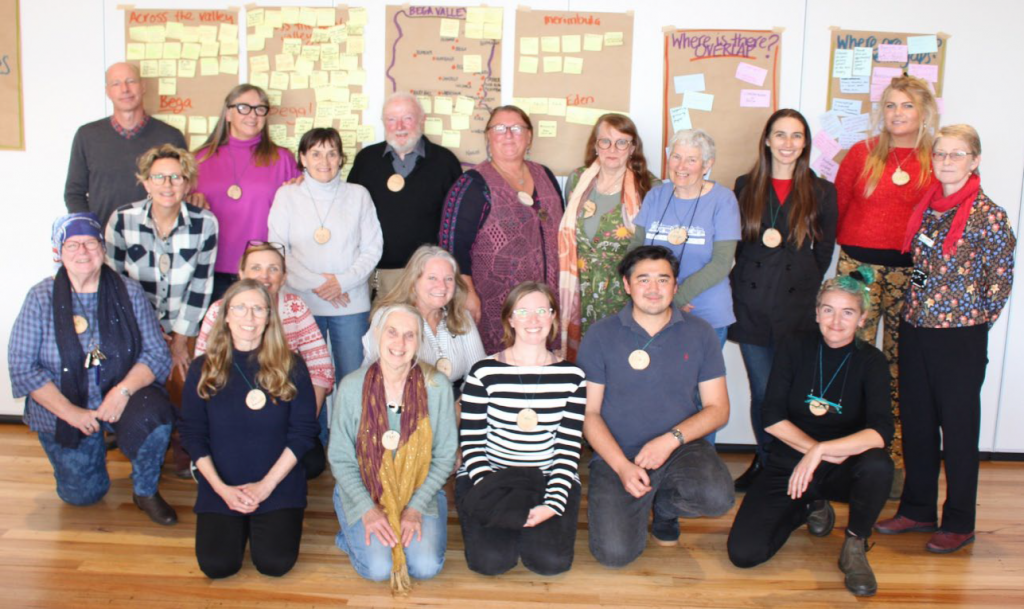
The IRCF Bega Valley – Resilience Connection and Place Project builds on the Investing in Not-for-Profit Capacity program, which FRRR has been running in Bega over the last 18 months.
The investment will allow for two community development project officers to be appointed – one full time, one part-time – in partnership with the Bega Valley Shire Council. They will work closely with local NFP organisations and community groups, including the three Local Aboriginal Land Councils (LALC’s).
An important part of the program will be to develop a ‘roadmap’ for the local not-for-profit and community sector, to identify common areas of interest, shared assets and needs for capacity building. Once these needs are identified, the IRCF Community Development Project Officers will develop relevant resources and help facilitate training and other support to help NFP’s to maximise the impact of their work. They will also provide support in accessing other grant funding for the various groups that get involved.
The program will also deliver leadership training into the community, thanks to a partnership with the Australian Rural Leadership Foundation.
FRRR’s People Programs Portfolio Lead Deb Samuels says that this really is a collaborative, community-driven program.
“FRRR has worked hand in hand with community groups over the last 20 plus years, so we know that locals are best placed to know what they really need. Our role is simply to help facilitate the support that they need – and that’s exactly what this program is going to do.
“We’ve rolled out this model successfully now in seven other locations across NSW, so we know that this approach of bringing local NFPs and community groups together really works, especially when you combine it with on-the-ground facilitators. Together, they can identify common issues and opportunities and collectively prioritise where investment is needed, and what form it should take – including paying particular attention to ensuring it’s inclusive and culturally appropriate – to build their capacity as a sector.
“We’ve seen some fantastic spin-off investment and leveraging of resources and we fully expect the same to happen in Bega Valley communities. We’re really excited to get started!” Ms Samuels said.
Applications are now also open for the two facilitator roles, with details on the Bega Valley Shire Council site.
Designing and tailoring the IRCF program is a highly collaborative process. The next step is for FRRR, Bega Valley Shire Council and Australian Rural Leadership Foundation to meet with some key local leaders and start to map out how to harness this opportunity to build on what is already happening in the Bega Valley.
To find out more about the IRCF program or to get involved, visit ircf.frrr.org.au/Bega or contact FRRR Carolyn Ardler, IRCF Program Coordinator – South Coast on 1800 170 020.
Plus workshops scheduled re fundraising for NFPs and strengthening local connections
The Foundation for Rural & Regional Renewal today shared that a $1.3 million funding boost for the Shoalhaven region to further enhance the capacity of local not-for-profit organisations to support their communities has already started to roll out.
The funding is thanks to a partnership with the Australian Government, through the Black Summer Bushfire Recovery Program.
The additional investment means that even more of the ideas and initiatives identified through the Investing in Rural Community Futures (IRCF) program to continue the ongoing recovery following the Black Summer bushfires can be implemented across the Shoalhaven region. Thanks to support from The Snow Foundation and more recently Bendigo Bank through their Community Enterprise Foundation, FRRR has been working with communities in the Shoalhaven and South Coast area since 2020.
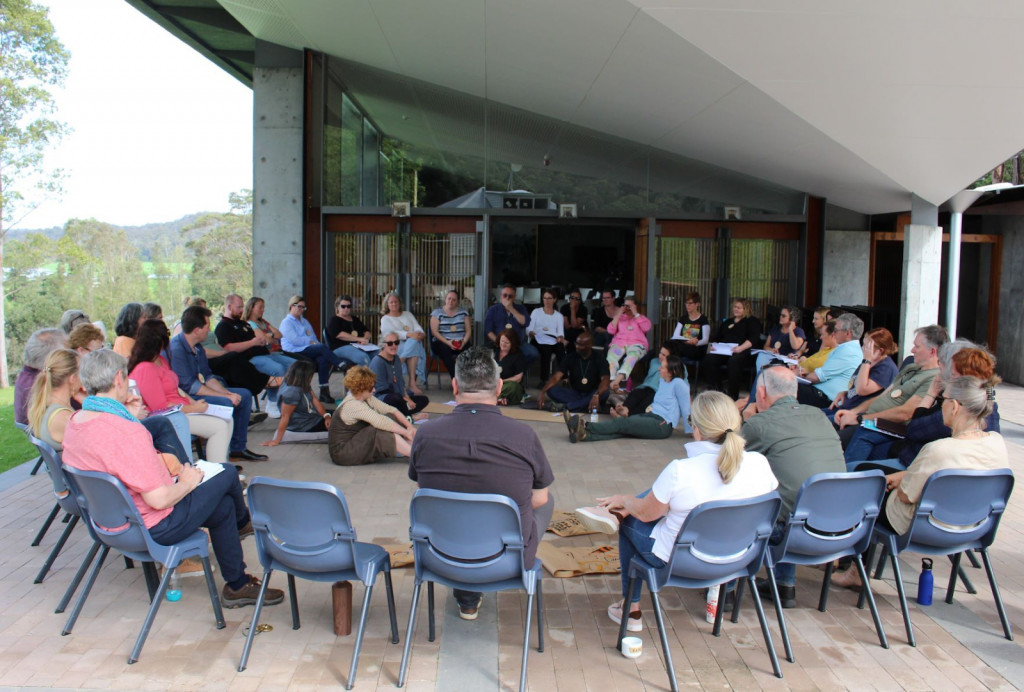
FRRR People Programs Portfolio Lead Deb Samuels says that this funding will benefit communities across the Shoalhaven region, all of which were impacted by the 2019/20 Black Summer Bushfires.
“This generous funding means that FRRR and our partners can continue to work with local community groups and not-for-profits to enhance their capacity to support their communities. We’ve already started by reviewing the roadmaps that were created previously and refreshing them in light of the bushfires and more recently flooding and the ongoing impacts of COVID.
“Practically, it means that FRRR can keep our facilitators on the ground in the Shoalhaven, so they can work directly with community groups to maintain the momentum that has built up over recent years through the IRCF program. They will continue to bring the community together and to implement the roadmaps identified for each of the participating communities.
“Perhaps most excitingly, it means that we have also been able to expand our support to Kangaroo Valley and Lake Conjola – again, two areas that were significantly affected by the fires.
“We recently funded 20 places at the Art of Hosting and Harvesting Conversations that matter in Bundanon. This three-day training session has equipped more local people with the skills to facilitate conversations that can lead to coordinated action and positive change. We will be further supporting local not-for-profit leaders the opportunity to attend Art of Hosting in the Southern Shoalhaven on 8–10 February 2023.
“Each of the initiatives that will be supported in future address issues or opportunities that local groups have already identified and prioritised. For example, in partnership with the Australian Rural Leadership Foundation, we’ll be delivering a tailored year-long leadership program to 24 participants from across the community, thereby strengthening the leadership base for the future.
“All of these initiatives are designed to help local community groups to better support their communities and so we are extremely grateful for this additional support through NEMA,” Ms Samuels explained.
The Art of Hosting workshop certainly made an impact on participants. In one of the closing sessions, in response to a question about what they are taking from the event, one person said “Excitement & hope we can continue to collaborate in the Shoalhaven to nourish our communities”, while another commented “Feelings of respect and admiration for all, different expressions of experience and life stories, strengthened by sharing in the collective”. This additional funding will hopefully mean more of these sorts of sessions.
Registrations are also currently open for two more workshops that respond to local priorities – namely around fundraising, and building and strengthening connections and networking across not-for-profit. Representatives from any not-for-profit or community group are welcome to attend, but registration is required:
Ulladulla Session – Wednesday 23 November, 9-12 pm, Ulladulla Civic Centre –
Register: https://www.stickytickets.com.au/z0ves/frrr_ircf_program_community_workshop.aspx
Nowra Session – Thursday 24 November, 9-12 pm, Nowra School of Arts –
Register: https://www.stickytickets.com.au/0gf26/frrr_ircf_program_community_workshop__nowra.aspx
To find out more about the IRCF program in your community or to get involved, visit ircf.frrr.org.au or contact FRRR on 1800 170 020.
Eleven not-for-profits (NFPs) in Junee, Leeton and Nambucca Valley will share in $444,063 in grants. The funding is thanks to FRRR, in partnership with Vincent Fairfax Family Foundation (VFFF), through the Investing in Rural Community Futures (IRCF) program.
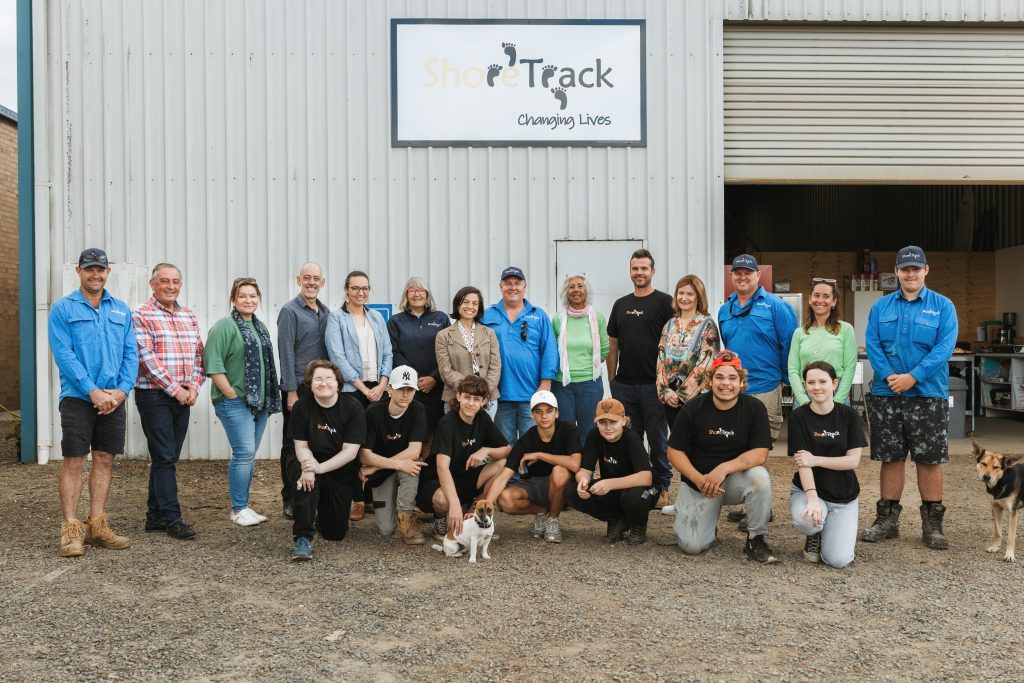
IRCF is a five-year program initially designed to support local NFPs in Junee, Leeton and Nambucca Valley. The goal is to support and build the capacity of locally-led organisations, so that they’re better equipped to deliver on their purpose and serve their communities.
As part of the program, FRRR works with community groups and leaders to create a roadmap that will help local organisations to work together towards achieving their goals and filling in the existing gaps within their communities. Program participants are offered a range of supports under the IRCF model, including access to a facilitator, grants, participatory planning processes, skill development, and external resources.
Natalie Egleton, FRRR CEO, said that the IRCF program in Junee, Leeton and Nambucca Valley is now in its fourth year and its success highlights how important it is to have place-based grant programs that focus on specific communities and their needs.
“This program is quite unique in the sense that it has operated over a number of years. This means that we get to go on a journey with these organisations, addressing issues they identify and working towards achieving the goals outlined in the road mapping process on what’s almost a step-by-step basis.
“At this stage of the program, the majority of the local NFPs being funded have previously received a grant through the program and are consolidating their efforts or building capacity to engage in more collaborative projects. The ongoing support and resources provided by this program give these communities consistency and the ability to plan for the long-term, both of which are crucial for creating sustainability and self-sufficiency in the future, once the program comes to a close,” Ms Egleton said.
“In this round, we clearly saw an emphasis on financial sustainability by the local organisations in these three communities. Program participants are working towards revenue diversification, improving financial systems and amplifying their value proposition, all of which are really important considerations for NFPs in remote, rural and regional Australia given the economic uncertainty we’re currently facing,” Ms Egleton said.
The full list of grant recipients and their projects are below:
| Organisation | Project | Location | Grant | |||
|---|---|---|---|---|---|---|
| JUNEE PARTNERSHIP GRANTS | ||||||
| Junee Community Centre Inc | Financial Sustainability and Responding to Community Needs Improve sustainability through focused activity to strengthen financial systems, enable land acquisition and scoping towards the development of a Community Hub. | Junee | $33,648 | |||
| Junee Business & Trades Incorporated | Revitalisation Strategy Revitalising Junee Business and Trades Inc through the development of strategic and marketing plans and improved financial management. | Junee | $27,894 | |||
| Cooinda Court Aged Care Ltd | Independent Living Study Boosting financial sustainability and organisational efficiencies through a feasibility study to explore revenue diversification and the consolidation of client information systems including the enhancement of a compatible finance program. | Junee | $19,286 | |||
| Junee Show Society Incorporated | Strategic Planning for Junee Showgrounds Creating a Strategic Plan for the Junee Showgrounds in collaboration with User Groups, to enhance coordination and the venue to be compatible with modern needs. | Junee | $23,491 | |||
| LEETON PARTNERSHIP GRANTS | ||||||
| Leeton Jumpstart | The Transformation of Leeton JumpStart Fund Operationalizing strategy, diversifying revenue, and upskilling volunteers to future proof the Leeton Jumpstart Fund. | Leeton | $38,980 | |||
| Leeton Connect Inc | Grants Support Coordinator and Collaboration Consultant Consolidating strategic objectives and symmetries across the Leeton NFP sector to inform grants support coordination and future partnerships. | Leeton | $56,570 | |||
| Leeton Business Chamber Incorporated | Building Capacity of the Volunteer Base to Ensure Sustainability and Business Continuity Strengthening Leeton Business Chamber through supported coordination of the new Leeton digital hub, volunteer training, governance enhancements and maintaining partnerships. | Leeton | $60,000 | |||
| NAMBUCCA VALLEY PARTNERSHIP GRANTS | ||||||
| Shoretrack Ltd | YP Connect Tech Building connections and understanding between ShoreTrack young people and the NFP sector through collaborative multi-media workshops and work experience opportunities. | Macksville | $45,000 | |||
| Miimi Aboriginal Corporation | The Leadership Growth Project Revitalising Miimi Aboriginal Corporation through additional human resourcing to support wellbeing, cultural leadership, social enterprise development and operationalizing a new strategic plan. | Bowraville | $50,000 | |||
| Mujaay Ganma Foundation Aboriginal Corporation | Mujaay Ganma Nyanggana Embedding succession planning and financial sustainability through building cultural knowledge and skills in youth trainees. | Bowraville | $45,764 | |||
| Bowraville Communication Technology Centre Incorporated | Community Printing Services and Volunteer Support Training Rejuvenating volunteer efforts and service delivery through equipment upgrades and First Aid training. | Bowraville | $12,430 | |||
On Gumbaynggirr Country
The Nambucca Valley in NSW was one of the first participating communities in the Investing in Rural Community Futures Program, which FRRR has been running with the support of VFFF since 2019. The program aims to help local not-for-profit organisations build their capacity so that they can better support the communities they serve.
One such group is Mujaay Ganma Foundation, which was established in memory of two strong, proud Gumbaynggirr women – Mardi Walker, Mujaay and Florence Ballangarry, Ganma. The Foundation grew from the need to bring back cultural strength and trust to people and families who are dealing with cancer. But it’s grown to offer far more than that, supporting Aboriginal people and their families with culturally friendly, emotional, physical and spiritual support. Through culture and sustainable practices Mujaay Ganma also endeavours to support a healthy lifestyle in the modern Nambucca Valley.
One of Mujaay Ganma Foundation’s goals is to create the Yuraal Guunumba Ngurraay: Gumbaynggirr Native Foods Community Garden Project, which will improve the wellbeing of local Gumbaynggirr Country and community. The garden will be a space where Elders can share cultural values and pass on traditional knowledge and skills to younger generations. It will also encourage students and youth to learn about native forest and riverbank regeneration and ecosystems. There is also a plan to help young people learn the identification and properties of native plants needed for regeneration of degraded country, seed collection and propagation and nursery management skills. Ultimately, this will ensure the passing on of cultural knowledge from Elders and promote its value to the wider community. In addition, the hope is that the garden will help to connect young Gumbaynggirr people to Country, strengthen a sense of community and build the skills of local community members, leading to meaningful employment and freedom from welfare dependence, which contributes to community wellbeing. Importantly it will contribute to a healthy lifestyle, culturally, physically and collectively.
Ultimately the project aims to build the capacity of young Gumbaynggirr people, encouraging them to contribute to a more collaborative and cohesive community. This will be achieved by strengthening the passing on of cultural knowledge between Elders and the younger generations, strengthening pride in culture and in the identity of the young.
Furthermore, the wider Nambucca Valley community would have the opportunity to learn from the custodial people enabling more respectful appreciation for the original culture and abundant natural resources, so sustaining a healthy environment into the future.
However, with only being established in 2019, the organisation recognised that it needed to build its capacity before it could embark on such an ambitious project. By training local Gumbaynggirr coordinators, the project will support community leadership. These trainees could become well versed in project management and able to constructively give back to community in the future. These trainee project coordinators could learn these contemporary skills through being mentored by experienced project managers, learning how to negotiate resources, funds and engaging with other organisations by working with their mentors, learning ‘on the job’, at the same time as being supported in their culture by the custodial Elders of Country. This approach was chosen, as successful learning experiences for community people have involved learning while observing and engaging in doing.
This fit well into the priorities of the IRCF program, which included people, strategy systems and structure and sector efficiencies. They therefore applied to FRRR for a grant to enable them to hire and mentor two Gumbaynggirr people as trainees, who could then take on management of all the complex logistics involved in implementing the Yuraal Guunumba Ngurraay garden project. This was also an opportunity to help ensure that young Gumbaynggirr people are safe, connected to Country and have meaningful work.
With the support of a $38,443 FRRR IRCF grant, funded by VFFF, two trainee project coordinators were recruited and have been learning on the job. Their work has included:
- learning about workplace expectations and creating a culturally safe working environment;
- strengthening their connection to Country and culture, with Elders taking them on Country and experiencing ceremony;
- setting up systems and administrative work, including writing policies and keeping records of the planning and implementation of the many components of this complex project;
- creating a food garden under guidance of a horticultural mentor with experience working in the Aboriginal community at Miimi Aboriginal Corporation, where they learnt about garden preparation, irrigation, planting seeds and transplanting seedlings in preparation for establishing the Yuraal Garden;
- learning about caring for Country from a Traditional Custodian with land management skills; and
- managing a successful Golf and Bowls Day fundraising event, which was successful not just in raising money but in creating an event where community could come together, learn more about Mujaay Ganma Foundation and have a good healthy time together.
The training of the coordinators and the future establishment of the Garden is highly collaborative and involved several community organisations, including:
- Miimi Aboriginal Corporation, who provided continual support of resources and consultation;
- Earth Trust and Yarranbella, with support from Miimi, who mentored the trainee coordinators as they learnt to negotiate and navigate between Aboriginal and non-Aboriginal systems, between organisations and students and teachers;
- Bowraville Innovative Social Enterprise Precinct (BISEP) who helped them negotiate Western institutions and regulations;
- Muurrbay Aboriginal Language and Culture Co-operative who provided continual support of resources and consultation, in particular around language and culture;
- Gagu Land Services will took participants onto Country to help learn about caring for Country and land regeneration;
- Yarranbella Environment Services who provided the horticulturist and registered teacher, who will help develop the training package needed for the garden to be created; and
- Nambucca Valley Council who provided land for where the garden project will occur.
The Foundation was able to leverage the grant to secure wage subsidies and additional funding that meant the trainees have, with guidance, developed job descriptions, run recruitment information sessions, established a viable workplace for new recruits and learnt to supervise new staff.
Janette Blainey, Project Manager says they are proud to still be operating and to have succeeded in expanding.
“This grant we received under FRRR’s IRCF funding gave us the support and improved capacity to successfully apply for a further grant to establish a Native Seedbank and to train other young Gumbaynggirr people in custodial land management.
“While we still face challenges from the impacts of dispossession, racism and continuing colonising attitudes within the community, Mujaay Ganma Foundation has become stronger and better able to contribute more to the community. Our young trainee coordinators are growing in confidence and have pride in their culture and community, and are learning more about their culture and their Country. They are ready to step up when needed. Other young people have acquired knowledge, skills and a positive attitude to gardening an extensive food producing garden for the community to access. We also have two employees who are gaining project coordination skills. It’s also great to see improved relationships between Elders and younger community members.”
For more inspiring stories like this, head to our FY 2021/22 Annual Review.
Four local NFPs awarded grants
In partnership with the Bendigo Bank Community Enterprise Foundation, FRRR has awarded a further $50,293 to support four not-for-profit organisations (NFPs) in the Bay & Basin area. Bay & Basin NFPs have now received nearly $150,000 to date through the Investing in Rural Community Futures (IRCF) program, which is helping to address locally-identified priorities.

The IRCF program is a multi-year program designed to foster collaboration between local NFPs and strengthen their capacity, so they can continue to have a positive impact on the vibrancy and wellbeing of their communities. The program operates across the South Coast region, and in three other locations across NSW.
As part of the IRCF program, local leaders participated in community meetings and created a roadmap of the future opportunities they envision for their communities. This helped to identify the areas where the community groups and NFPs need support and ensures that the solutions being provided through the program are community-led.
The four funded projects cover various areas including strategy development, resilience training, equipment upgrades and human resources. One example is the Huskisson Op Shop who are engaging a paid Coordinator to support the Op Shop Volunteers, as well as a Business Advisor, who will help to modernise the Op Shop to support their food pantry in St Georges Basin.
Natalie Egleton, CEO of FRRR, said that multi-year programs, like IRCF, are vital for these remote, rural and regional communities.
“The NFPs in Bay & Basin play a big role when it comes to the quality of life for people living in these communities. Local leaders know what will work, so our role is to support them to create locally-led solutions that can be implemented over a series of years. This ensures that these communities thrive long into the future,” Ms Egleton said.
David Impey, CEO Community Enterprise Foundation, the Bendigo and Adelaide Bank’s charitable arm, said that the grant recipients are committed to developing all aspects of their organisations.
“It’s inspiring to see these people who are willing to take such a multi-faceted approach when it comes to building resilient communities. Through this program they’re developing their skills, strengthening their relationships with their peers, improving their processes and engaging in some really productive conversations.
“These organisations are powerful advocates for their communities. We’re very thankful to be able to support their efforts in creating sustainable and long-term solutions that will see the lives of everyone in Bay & Basin made that much more vibrant,” Mr Impey said.
The four projects being funded are:
- Vincentia Ratepayers and Residents Association Inc, Vincentia – Prepare, Develop, Publish and Regularly Update the Vincentia Ratepayers and Resident Association 2030 Strategic Vision Document – $7,000
- Sussex Inlet District Chamber of Commerce Incorporated, Sussex Inlet – Sussex Inlet, a Vibrant Future- Building the capacity of our communitythrough resilience training and by developing a marketing campaign – $3,900
- Sanctuary Point Community Pride Incorporated, Sanctuary Point – Boosting Pride by fostering community engagement and enhancing organisational capacity through the development of a website, communications strategy, and accounting software – $10,309
- UCA – Bay & Basin, St Georges Basin – Growing the Husky Op-shop by building organisational capacity to enable a stable of aligned social enterprises – $29,084.
In addition to Bay & Basin, the IRCF South Coast program is also working in Nowra, Batemans Bay and Ulladulla, with the support of The Snow Foundation and in Junee, Leeton and Nambucca Valley in partnership with the Vincent Fairfax Family Foundation.
For more information about the Investing in Rural Community Futures program visit – https://frrr.org.au/ircf-program/.

